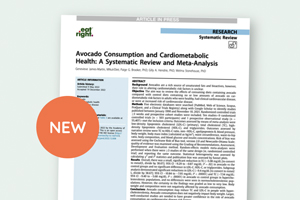The lutein and zeaxanthin carotenoids found in avocado have been found to have antioxidant and anti-inflammatory effects. Known as ‘macular pigments’ because they are found in the retina, high concentrations of these pigments are associated with improved cognitive performance.
A recent systematic review examined the results of 18 studies – seven randomised clinical trials (RCT) and 11 observational studies.
The majority of the observational studies found a correlation between cognitive function or brain activity and macular pigment optical density (MPOD).
Six of the seven RCTs found increasing dietary intake of lutein or zeaxanthin increased MPOD and significantly improved most of the cognitive functions studied. The functions most closely associated with MPOD were memory, processing speed, attention and reasoning. This systematic review found a direct relationship between cognitive function, macular pigment and dietary intake of lutein and zeaxanthin.
Practice tips
- Promote avocado as a food that supports brain health and cognition, as part of an overall healthy diet
- Incorporate avocado into menus for older people to help support cognitive wellbeing
- Mashed avocado or avocado dip are easy to prepare and easy to eat
Reference
García-Romera MC, Silva-Viguera MC, López-Izquierdo Iet al. Effect of macular pigment carotenoids on cognitive functions: A systematic review. Physiol Behav. 2022 Oct 1;254:113891. doi: 10.1016/j.physbeh.2022.113891. Epub 2022 Jun 23. PMID: 35752349.



